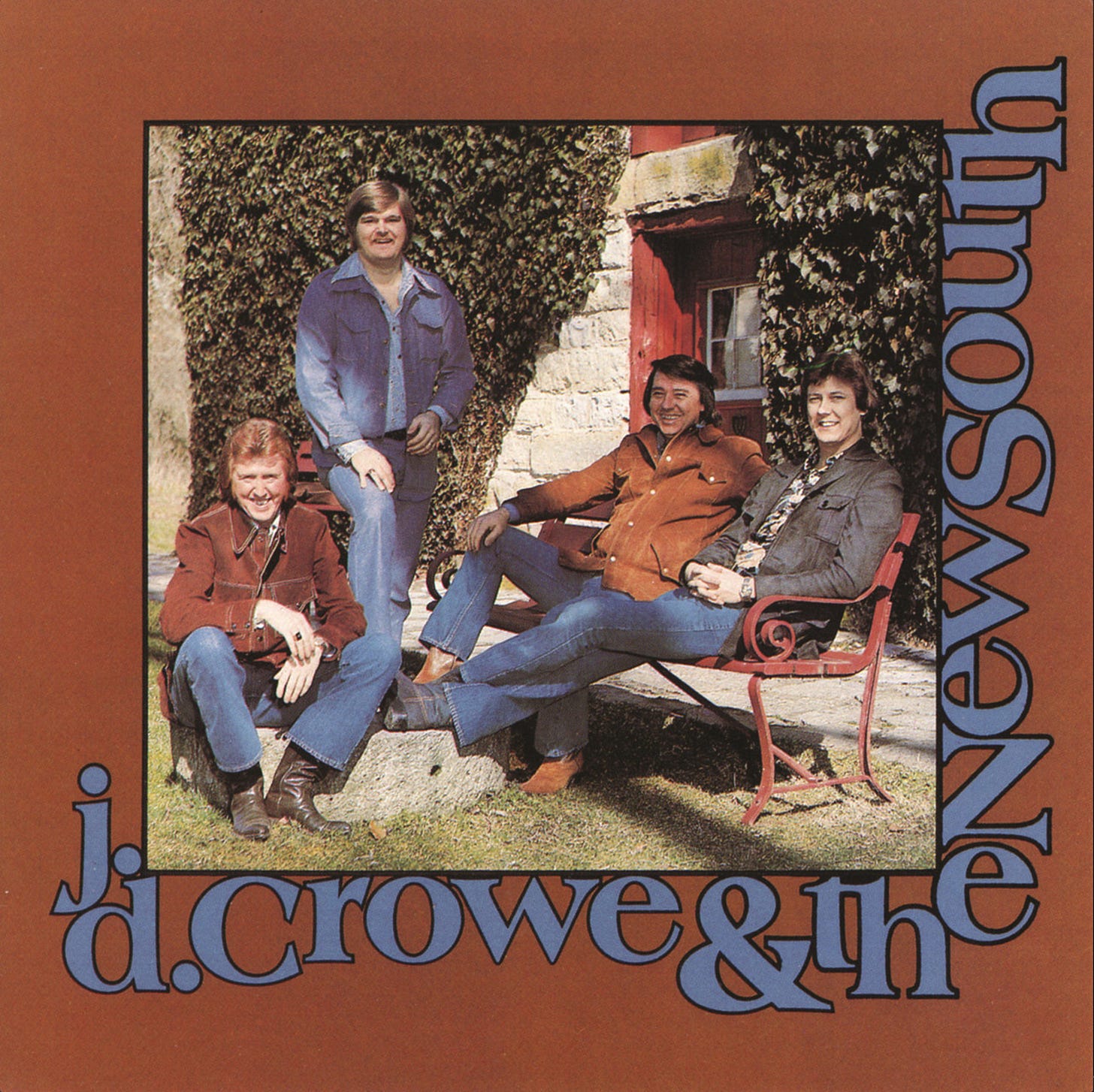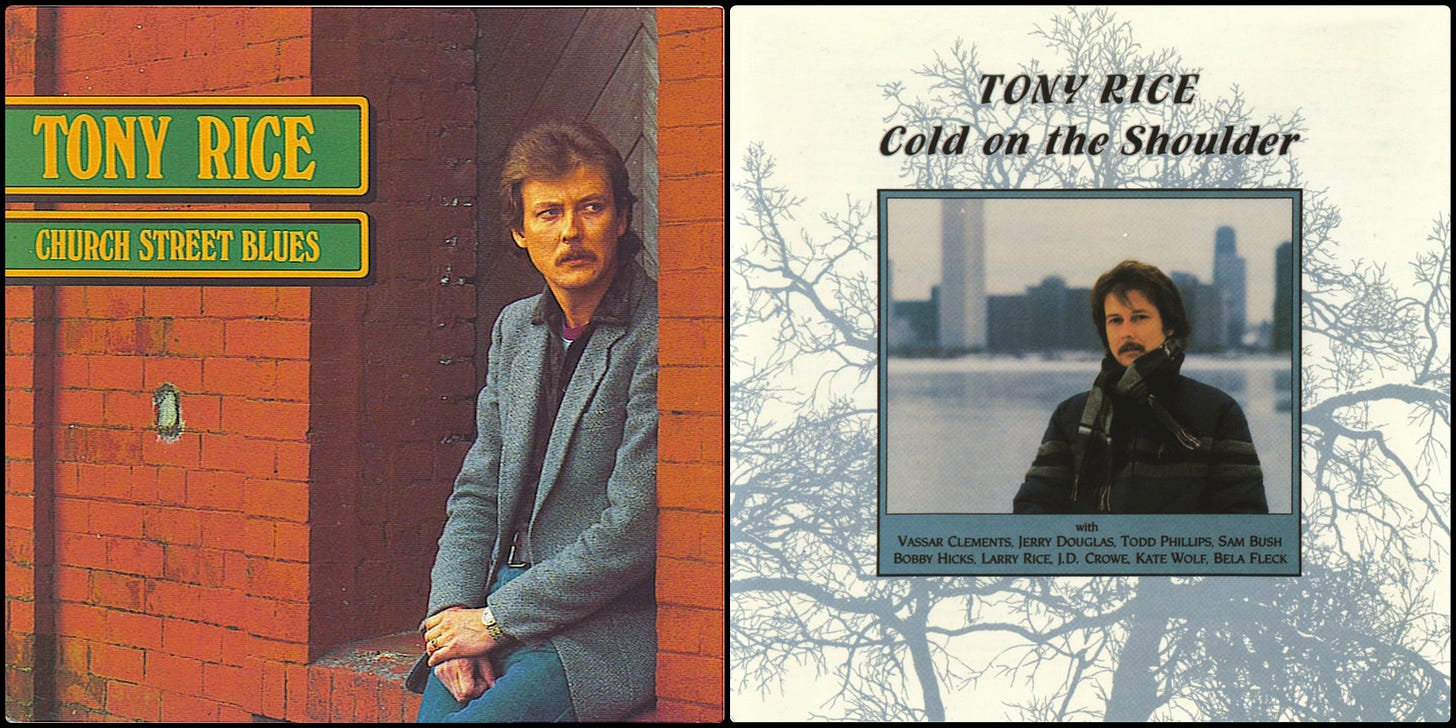A Tony Rice Primer
Seven defining albums
The passing of Tony Rice is a major event in bluegrass history. (My obituary is here.) Without going too far out or “crossing over” in any way that bothered conservative fans, Rice was free to pursue two complimentary paths. He was washed in the blood of the old bluegrass repertoire and could sing “Nine Pound Hammer,” “Little Sadie” and “How Mountain Girls Can Love” as well as anybody. Yet he was also a searcher who studied jazz and brought judicious amounts of its harmonic complexity to his guitar support and his lead playing. He was without question the most influential guitarist in bluegrass history (though he stood on the shoulders of Doc Watson and Clarence White), and he advanced his instrument’s role in American music as surely as Earl Scruggs did for the banjo and Jerry Douglas on the dobro. If you are new to his deep discography, here’s an orientation to seven key recordings that encompass the genius of Tony.
J.D. Crowe And The New South - Rounder 0044 - 1975
This was neither Tony’s first band nor his recording debut, but this is an ideal album to start your Tony Rice journey or any bluegrass journey for that matter. He was just over 20 years old when he landed just where he needed to be, in the superb, disciplined Kentucky outfit led by banjo maestro J.D. Crowe. Rice let Crowe mentor him and shape his musicianship on guitar and lead vocals. When a very young Ricky Skaggs joined the band in ‘74, the chemistry was instant, and their first album with this lineup, plus the guest dobro of Jerry Douglas, produced a self-titled masterpiece that fans refer to by its catalog number, 0044. The opener “Old Home Place,” drawn from The Dillards, defined this as a parking lot jam favorite, as so many of Tony’s vocals did. His singing throughout is pristine and cool but emotionally rich. His guitar intro and singing on “Ten Degrees” are textbook Tony and an introduction to his long history of bringing Gordon Lightfoot songs to their full flower.
Manzanita - 1979
Moving from East to West and back to California where he grew up, Rice teamed up with mandolin iconoclast David Grisman to develop the jazz-grass fusion that Grisman called Dawg music. The 1977 album The David Grisman Quintet features Tony prominently in a decidedly jazz leaning classic. But you can hear Tony’s continuation and personalization of what he developed with Grisman in the bluegrass hybrid Rice album Manzanita of 1979, released as The Tony Rice Unit. The title cut is Dawg in style but the composition is Tony’s. Then there are some of the greatest arrangements of bluegrass standards you’ll ever hear, including “Little Sadie” and “Nine Pound Hammer.” To hear Tony shift from the sprightly and swinging “Blue Railroad Train,” an inspired Delmore Brothers cover, to the serene “Midnight On The Stormy Deep” is a lesson in his range and sensitivity.
Skaggs & Rice - 1980
Country music was built in part on lonesome vocal duets and the brother bands of the 1930s and 40s. This modern-day masterpiece of the form pairs two voices that were meant to sing together. Ricky and Tony interpret Bill Monroe, the Carter Family and the Stanley Brothers and leave us astonished at the impact that two voices and two instruments can make.
Church Street Blues - 1983 / Cold On The Shoulder - 1984
Tony’s fourth and fifth solo albums come from the most fertile and inspired time in his career and make a perfect matched pair. Church Street Blues is an uncanny solo outing (with touches of brother Wyatt on support guitar in the instrumentals) that lets us hear Tony’s intricate but floating guitar style and the richness of his voice. It’s full of more material that sent legions of us to our guitars to work up our own versions. The Norman Blake songs, the title cut and “Orphan Annie” struck me particularly hard, and I have never enjoyed playing or singing a song as much as Tony’s “Any Old Time” from Jimmie Rodgers. Then he quickly followed with the band album Cold On The Shoulder. Listen to how his guitar establishes the theme and sway of the opening track, and indulge in the first album version of “Wayfaring Stranger,” a tune Tony would refine and decorate for the rest of his playing years.
Blake & Rice - 1987
I did not have any idea in 1987 that I’d become a professional working in roots music, but this album is certainly where that journey began. A friend gave me a dubbed cassette of this intimate guitar/voice album and it unlocked mysteries I’d been circling around, showing me the power and accessibility of the guitar. “New River Train” was the first song I worked up to sing and play on the acoustic. The guitar updates of old fiddle tunes - “Texas Gales” “Stony Point” “Whiskey Before Breakfast” - are core curriculum for any flatpicker, played here with incisive economy and soul. I began a love affair with Norman Blake songs here as well. “Greenlight On The Southern” felt like the rural North Carolina I’d come to love as a kid. “Last Train From Poor Valley” took my breath away and still does.
Bela Fleck - The Bluegrass Sessions - Takes From The Acoustic Planet, Vol. 2 - 1999
After 1994, Tony had to give up singing, but he became the focused instrumentalist he wanted to be, and most often he was making magic with an ad hoc supergroup featuring Bela Fleck, Jerry Douglas, Sam Bush, Stuart Duncan and Mark Schatz. Tony is on Vol. 1 of this series, but that’s a very jazz and almost neo-classical album. This one has a bluegrass heart with immense imagination and group interplay. Tony’s intro to and support playing on “Spanish Point” is a distillation of his late career approach. The record features some fun surprises featuring John Hartford as well. This is one of the defining albums in the history of newgrass, made so in large part by Tony’s time and harmonic richness.
String Theories is a free journal and newsletter about music, politics and culture. Please leave your email for occasional drops in your in-box.







I would suggest that Tony's Native American album deserves a place on your list. He was still singing then, and it served as an introduction to his music to many folks who weren't hardcore bluegrass fans.